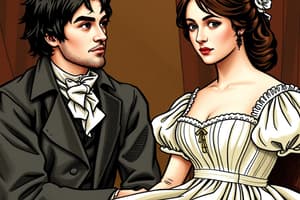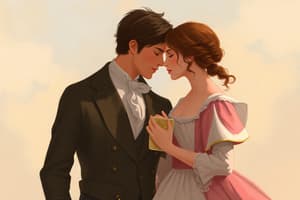Podcast
Questions and Answers
Does the novel fulfill its 'thesis statement' - 'It is a truth universally acknowledged that a single man in possession of a good fortune must be in want of a wife'? How so? With which men?
Does the novel fulfill its 'thesis statement' - 'It is a truth universally acknowledged that a single man in possession of a good fortune must be in want of a wife'? How so? With which men?
The thesis statement is fulfilled with Mr. Bingley because he was looking for a wife from the very beginning. Mr. Darcy, however, just happened to fall in love. It was never his true intentions to find love. He fell in love unwillingly.
What qualities does Austen most value in her female characters? Which characters demonstrate these qualities and how do they do so?
What qualities does Austen most value in her female characters? Which characters demonstrate these qualities and how do they do so?
Austen values education and independence for women in her novels. Elizabeth and Jane demonstrate these qualities throughout the book. They are both very educated, qualified, and mature, showing independence by marrying for love rather than being boy crazy.
What qualities does Austen censure or criticize in her female characters? Which characters demonstrate these qualities and how do they do so?
What qualities does Austen censure or criticize in her female characters? Which characters demonstrate these qualities and how do they do so?
Austen criticizes the want or need for having a husband, as demonstrated by Mrs. Bennet, Kitty, and Lydia. Mrs. Bennet is focused on marrying off her daughters, and Kitty and Lydia are portrayed as boy crazy, indicating an unhealthy obsession with men.
What qualities does Austen most value in her male characters? Which characters demonstrate these qualities and how do they do so?
What qualities does Austen most value in her male characters? Which characters demonstrate these qualities and how do they do so?
What qualities does Austen censure or criticize in her male characters? Which characters demonstrate these qualities and how do they do so?
What qualities does Austen censure or criticize in her male characters? Which characters demonstrate these qualities and how do they do so?
What are some possible themes regarding marriage in the novel? What are Austen's specific positions on the subject?
What are some possible themes regarding marriage in the novel? What are Austen's specific positions on the subject?
What makes a good marriage vs. a bad marriage?
What makes a good marriage vs. a bad marriage?
To what extent have the protagonists amended their flaws by the end of the novel? How have they changed for the better?
To what extent have the protagonists amended their flaws by the end of the novel? How have they changed for the better?
Flashcards are hidden until you start studying
Study Notes
Thesis Statement
- The novel asserts, "It is a truth universally acknowledged that a single man in possession of a good fortune must be in want of a wife."
- Mr. Bingley exemplifies this as he actively seeks a wife from the start.
- Mr. Darcy's love for Elizabeth develops unexpectedly, indicating he did not originally intend to find a partner.
Female Character Qualities
- Education and independence are the qualities Austen values in women.
- Elizabeth and Jane represent these ideals through their maturity and reluctance to marry for anything less than love.
- Austen criticizes the dependence on marriage seen in characters like Mrs. Bennet, Kitty, and Lydia, who prioritize courtship and marriage above personal agency.
Male Character Qualities
- Austen appreciates education and good manners in male characters.
- Mr. Bingley is portrayed as the ideal gentleman.
- Mr. Darcy evolves throughout the story, showing commendable qualities, especially later on.
- Rudeness, arrogance, and self-serving marriage motives are criticized; Mr. Wickham and Mr. Collins are prime examples of these flaws.
Themes of Marriage
- Marriage is a central theme, with contrasting motivations for marriage explored.
- Mrs. Bennet’s fixation on marrying off her daughters represents societal pressures rather than personal happiness.
- Austen posits that marriage should be grounded in love, not financial security, highlighted by Charlotte's pragmatic marriage to Mr. Collins.
- Healthy marriages are characterized by mutual affection, while unhealthy marriages are those founded on exploitation or financial necessity.
Character Flaw Amendments
- Mr. Darcy acknowledges his earlier arrogance and demonstrates growth by apologizing to Elizabeth and clarifying misconceptions.
- Elizabeth realizes her prejudgment of Darcy was misguided, leading her to embrace a more open-minded perspective.
- Both characters, by the end of the novel, have learned valuable lessons about personal growth and the importance of true character over first impressions.
Studying That Suits You
Use AI to generate personalized quizzes and flashcards to suit your learning preferences.




